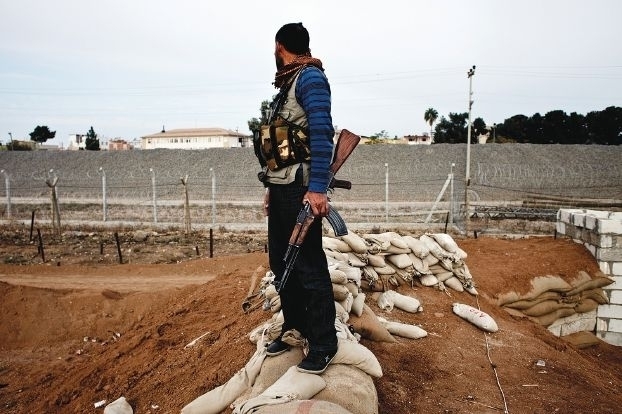Syrian Kurds have been greatly affected by what is happening in neighboring Turkey and Iraq, as much as they have been affected by what is happening in Syria.
If their demographic- geographic division within Syria's borders does not encourage independence aspirations, these are strongly fed by neighboring Kurds in Iraq and Turkey and by the events taking place there.
Thus, the establishment of the federal entity of Kurdistan in northern Iraq was the first motivation for the 2004 uprising in Qamishli and other Kurdish parts of Syria, including areas of Damascus and Aleppo.
Syrian Kurdish fighters consist about a third of the total number of PKK forces in Turkey, while its Syrian branch, the Democratic Union Party (PYD) is the strongest Kurdish party in Syria.
While the relative separation of the Kurdistan region in northern Iraq was a consequence of the U.S. invasion of Iraq, the strategy followed by the Damascus regime to face the popular revolution against it provided a relative separation of Kurdish areas in Syria.
However, competition between the two Kurdish leaders, Barzani and Ocalan in Iraq, reflected negatively on Kurds in Syria, and it is likely to continue to negatively affect their fate in the near future. While Barzani rushes towards complete independence, taking advantage of the centrifugal policy practiced by Nouri al-Maliki and the establishment of the Islamic State by Abu Bakr al-Baghdadi, the three Kurdish cantons ruled by the Syrian branch of the PKK are suffering from both IS and Turkey. Turkey, which does not object to the establishment of an independent Kurdish state in northern Iraq, would not allow something similar in Syria, a state led by the supporters of Ocalan who is imprisoned in Istanbul.
The Kurdish cantons in Syria seem an easy target for the caliph al-Baghdadi. In fact, Syrian Kurds don’t have the means to establish their independent state, and their choices will be limited to joining a Kurdish state, either in Iraq or in Turkey. The first option is not realistic because the ruler of these cantons is the Syrian branch of PKK, which will not give its expected state to Barzani in northern Iraq, especially since the PKK has abandoned its independence aspirations in Turkey and is now trying to reach a peaceful solution with the Turkish government.
The leaders of the Democratic Union Party confirm every day that they do not seek independence from Syria despite their disagreement with the Syrian opposition which works to overthrow Bashar Assad. However, the relationship between the Democratic Union Party and the people in its cantons does not motivate Kurdish independence.
Human Rights Watch recently issued a special report on the violations of this party and its armed forces against the population. The report, entitled "Under Kurdish Rule", addressed different violations practiced by the party and its armed forces, including arbitrary arrests, abuse during detention, violations of due processes, the disappearance and murder constrained unknown, and the use of children in the ranks of the security forces of the party.
This report does not include the restrictions on freedom of expression and association, and the alleged violations against local non-Kurdish communities. We can add to this the persecution by the Democratic Union authorities against other Kurdish political parties and the restrictions on their activities.
There was an infamous incident when PYD forces prevented a number of representatives of Kurdish parties from returning to their homeland, after participating in a political conference in Erbil to unify their parties in a new political framework.
It is true that the Kurdistan Regional Government is far from perfect in terms of freedom and transparency, but there is a significant difference between an elected government with a charismatic leader (though marred by suspicions of corruption and restrictions on freedom of expression) and the de facto rule over people through crude dictatorial means in the three Kurdish Cantons in Syria.
On the other hand, there are mounting complaints about the treatment towards Syrian Kurds in Kurdistan, who are treated as "black sheep", according to many of those whose circumstances led them to move to live there. However, all of these negative factors seem insignificant in comparison to the danger faced by Kurds in the areas outside, especially where the Islamic State lays sieges, like in the canton of Kobanî (or Ain al-Arab in Arabic), north-east of Aleppo. This campaign was preceded by other campaigns during the past two years, led by IS, the Nusra Front and the armed factions of the Free Syrian Army in Ras al-Ain, the villages of Tal Abyad and some villages in Afrin, Azaz and al-Bab.
When it comes to an external threat, Kurds gather around the PYD's People Protection Units for protection. Indeed, these forces have imposed themselves on people on the pretext of protecting them, at a time when there was no external threat. But when this danger appeared in reality, this military power had no choice but to defend itself and the land it controls, more than defending its people. It failed to protect people in the countryside of Tal Abyad and other areas.
Beyond the popular rallying around the party, Kurdish volunteers from the PKK have come from the other side of the border with Turkey to join the People Protection Units to defend their brothers in Syria.
In summary, Syrian Kurds have limited options determined by other forces against their will, at a time when the borders between the countries of the Levant have collapsed. The bloody conflicts taking place are going to draw the destinies of peoples and nations for perhaps one hundred years to come.
Translated and edited by The Syrian Observer
......


